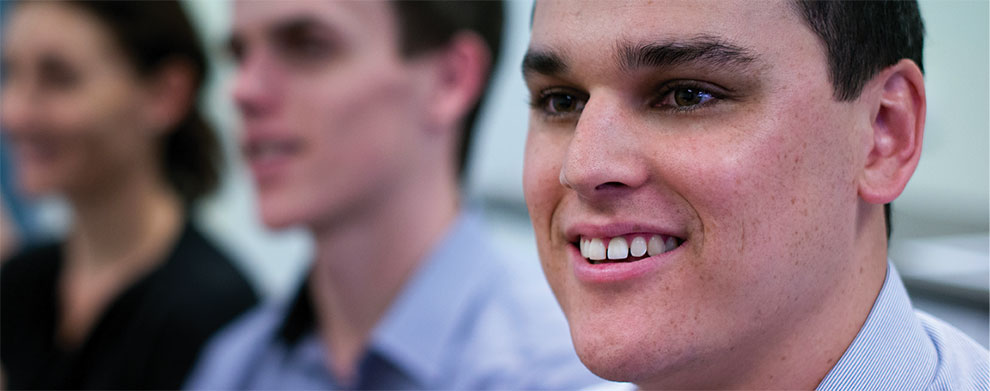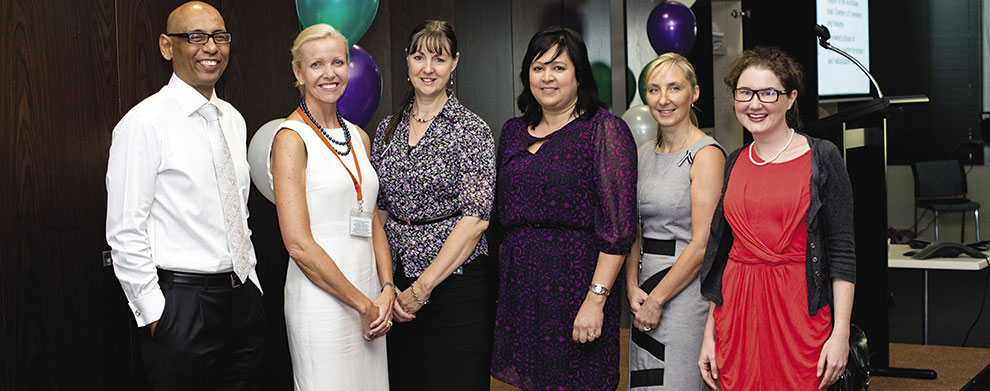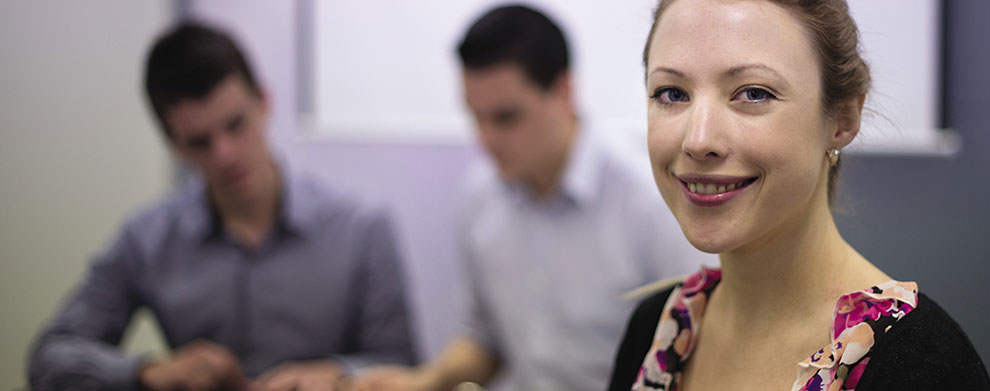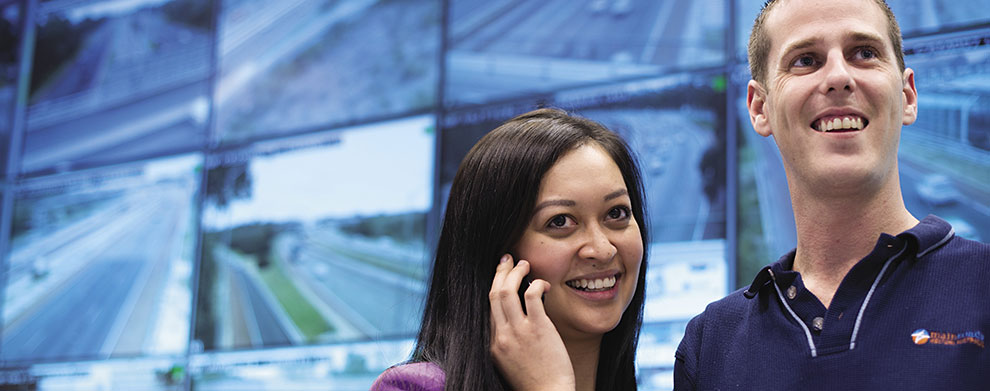
Developing Capabilities
Creating a Workforce for the Future
Not only do we seek opportunities to develop our present day workforce, but we also work towards ‘creating our workforce for the future’ as we believe our people can and do make a significant difference in the community.
Key Performance Indicators
2011 |
2012 |
2013 |
|
Women in Leadership (Level 5 & Specified Callings Level 2 and above) |
88 |
101 |
109 |
Total Employee Retention Rate % |
93% |
92% |
95% |
Introduction
The ‘Creating Our Workforce for the Future’ strategy is the key to creating an organisation where people embrace and accept those who aspire to bring innovative ideas, skills and perspectives to work. This strategy expands on one of the key areas of focus from our current Strategic Plan. It aims to ensure that the right people are attracted and retained to address future skill and competency needs that will sustain us into the future. Throughout the year, work continued on implementing a range of innovative, leading edge initiatives aimed at creating a workforce for the future based on a philosophy that our people are the key to a competitive edge.
Promoting Diversity and Equal Opportunity
We strive to create a rich and diverse workforce. There is strong emphasis on promoting equality to ensure our workplace is free from harassment and discrimination and that all employees have equal access to training, progression and promotion.
Our Diversity Committee continued its focus on Women in Management, Equal Employment Opportunity and deployment of our Reconciliation Action Plan.
The following is an update on some key achievements in this area.

Dr Donna Cross (2nd from left) with Executive Director Organisational Development, John Taya and Women in Management team.
Women in Leadership
Once again, we continued our focus on improving our female representation at senior levels.
The Diversity Committee continued to support the implementation of our ‘Women in Management’ (WiM) Action Plan which aims to attract, retain and develop women across the organisation, particularly in the technical and professional areas. It encourages women to apply for acting, developmental and promotional opportunities.
Since its implementation in March 2011, the representation of women in the workforce has improved. As at June 2013, 29% of our workforce was women with 33% of our permanent female employees in Level 5 and above positions, and 34% of all acting opportunities being filled by women.
Continuing our efforts with our WiM Action Plan, we have:
- Provided professional development opportunities for our women through short lunchtime ‘Making of Me’ workshops, lunchbox presentations from successful women in a broad range of industries and occupations, and participation in leadership development programs.
- Continued our Professional Women’s Speakers Series, targeting successful professional women to speak about their ‘Road to Success’. Two key speakers, Alannah MacTiernan, the Mayor of the City of Vincent and former Minister for Planning and Infrastructure (including Transport), and Dr Donna Cross, WA Australian of the Year 2013 were invited to share their stories with us this year.
- Launched a second mentoring program for Heavy Vehicle Operations (HVO) employees. Originally an initiative for women only, it has now opened up to all HVO and Road Network Services Directorate employees, creating 27 partnerships using senior managers in Main Roads and the Department of Transport as mentors.
- Promoted our flexible working arrangements in external job advertisements and encouraged women and people with diverse backgrounds to apply.
Reconciliation Action Plan
Our second Reconciliation Action Plan was finalised and endorsed by Reconciliation Australia in September 2012 and can be found on both our website and Reconciliation Australia’s website. Our Plan is a formalised commitment to a number of successful initiatives. One major focus is on increasing traineeships within the organisation to provide opportunities for Aboriginal youth.
One of the initiatives includes introducing cultural awareness workshops titled – ‘Engaging and Partnering with Indigenous People’ to increase employees’ awareness of Aboriginal culture. We hope that this will assist in developing more inclusive and culturally sensitive communication and relationships with Aboriginal colleagues, clients and stakeholders.
Harmony Week
‘A Taste of Harmony’ celebrates diversity in Australian workplaces by encouraging colleagues to share food and stories from different cultural backgrounds. Harmony Week allows us to celebrate the vibrant cultures, races and religions that make up Main Roads. All Directorates and Regional offices held morning tea or lunch events with participants bringing in a dish that celebrates their cultural heritage; discussing interesting aspects of other’s heritage and generally sharing new information about each other. This has become a highly popular annual event.
The ROADS Foundation
The ROADS Foundation addresses the growing need to promote the value and benefits of training and skills development within the civil construction industry. The Foundation supports creating a training culture within our industry, provides learning and development opportunities for young people from regional areas and marginalised backgrounds and, advocates for a sustainable civil construction workforce.
Since its inception, The ROADS Foundation has successfully assisted and supported 192 young people in civil construction traineeships through 12 road construction contractors/alliances, 17 Local Governments’ and across all Main Roads’ regional offices.
In the past 12 months The ROADS Foundation has begun supporting an additional eight existing worker trainees and has placed 20 new trainees within DownerMouchel, Abigroup, Leighton Contractors and in the Shires of Carnarvon, Dundas and Trayning as well as in our own organisation.
The ROADS Foundation congratulates the 31 trainees who successfully completed their traineeships last year and continues to support its 61 trainees across the State.
Through the establishment of a new strategic plan for the next three years, The ROADS Foundation will be focusing on developing strong people-focused services to prepare individuals for employment. To learn more, visit their webpage.
Family Day
Family Day promotes a healthy work-life balance while recognising all contributions to the organisation. Each Directorate and Region puts together a display for visiting family and friends outlining past achievements and current projects as well as new and upcoming projects and events. The day demonstrates the critical role our families play in our success and the value we place on this.
Giving back to the Community
Throughout the year, we support a number of charities including the Starlight Children’s Foundation Australia, SIDS and Kids WA and Cancer Council WA to name a few. This complements other initiatives including our ‘workplace giving program’ which enables staff to donate to selected charities throughout the year.
When the team from the Customer Information Centre (CIC) decided to do a team building exercise, they wanted to do something a bit different. They elected to participate in a charity event that would not only help to build a stronger team, but also give something back to the community. The CIC visited Ronald McDonald House in Subiaco to help out with some Christmas presents and festive cheer on behalf of Main Roads. This is a great example of our ‘family’ values’ in action.
Attraction and Retention
Workforce Planning
The workforce planning that we have undertaken has once again placed us in a sound position to, forecast and position the strategies needed to appropriately resource the organisation.
We use a comprehensive workforce planning program that revolves around the annual ‘Workforce Planning Cycle’ to determine a five-year forecast focusing on:
- A profile and scan of the current workforce
- Succession management
- Knowledge management
- Future resource needs
- Environmental factors
- Development employees.
Through the Cycle, we have developed a functional and innovative approach to workforce planning which attracts a higher level of participation from branch managers and supports forecasting for the future, knowledge management, capability and development employee programs in line with our strategic direction.
We also share information with other agencies throughout the year on how we involve our business through this approach. With the establishment of the Transport Portfolio, we have also taken the opportunity to work together with our Portfolio partners and recently embraced a leadership role to integrate workforce planning and build capability across the Transport Portfolio.
Recruitment
Over the past 12 months we advertised 91 positions, receiving 1,653 applications.
Calendar Year |
2011 |
2012 |
2013 |
Positions advertised |
45 |
128 |
91 |
Applications received |
649 |
1,898 |
1,653 |
Average applications per advertised position |
14.3 |
14.8 |
18.1 |
The increase in average applications rates reflects the changing economic environment in Western Australia.

Developing Our Employees
Development Employee Leadership
We actively promote the development of our next generation workforce through our Development Employee Graduate and Leadership Program. This program enables graduates to develop their skills while professionally enhancing and building their careers in a practical environment.
Our graduates receive valuable experience on the program through diverse rotations, mentoring, and continued alignment with the Engineers Australia Professional Development program. The formal training component requires participants to undertake a Diploma of Management including a practical workplace project. Our seventh group of participants has successfully completed the program while the eighth group is now partway through. A new contract was recently awarded to deliver the program for a further three groups over the next five years.
Project Management Development
A second cohort completed this innovative program aimed at developing and improving their competencies in the project management discipline. This program is targeted at employees working in business-related areas or on non-infrastructure projects. During 2012-13, 14 employees were awarded the nationally recognised Diploma in Project Management.
Senior Manager Development
In the fourth quarter of the year, we offered two new leadership programs designed to give our senior leaders the tools required to meet the leadership and strategy needs of our new 2020 strategy. A total of 50 places were allocated in this new program and are scheduled to begin in July 2013.
TechXchange
This program is an initiative that has been running successfully since 2005. The one-hour, monthly forum provides an opportunity for technical experts to share their knowledge and experience with other employees and technical partners. The sessions are designed to benefit all staff and stakeholders looking to improve their technical skills and network with our technical experts.
TechXchange has a distribution list of approximately 700 employees and over 400 external people that either attended or have presented at the TechXchange forum. Each session on average attracts around 90 people, with some Special TechXchange presentations attracting an audience in excess of 300 people.
Lunch and Learn Seminars
Our Learning and Development Branch has continued to run ‘Lunch and Learn’ sessions. Designed to broaden employees’ thinking and encourage creativity, these workshops complement key components of our leadership framework and include strategy, innovation, leadership and values. Each 45 minute session allowed employees to leave the sessions with useful tips and tools to apply to their own working life. Presentations were by experienced training and leadership development providers and included kits designed to engage leadership, management, creativity and innovation.
Competency Development
Almost 50% of our workforce has fewer than 10 years’ work experience with Main Roads; there is therefore a critical need to expedite the competency development of our younger employees who will be our workforce of the future.
The new Competency Development System is a competency-based approach for identifying and targeting the development of leadership and technical competencies of our workforce. This system focuses on the operational and career development needs of our employees. It supports our workforce planning, succession planning, knowledge management and learning and development strategies through our individual performance management and development process.
Inspiring Innovation
We strive to create and foster an environment where innovative thinking is encouraged, recognised and rewarded.
The approach taken with the 2020 strategic planning is in itself an example of innovation at Main Roads.
The use of Catalyst Teams to progress the development of 2020 and create the objectives, success factors and initiatives for the five key areas of focus is an innovation in strategic planning which has been highly successful. For more information, please refer to the Case Study.
The winners of the 2012 Commissioner’s Excellence Award for Innovation were David Landmark, Lou Palandri and Dennis Clarke for their work on the Eelup project in Bunbury. The Eelup Rotary was converted into a signalised roundabout, a first in Western Australia. To read more about this project, please refer to the Road Management section.
Research and Development
A Research and Development Framework has been developed that looks at the overall coordination and measurement of research and development in across the organisation. This new Framework consists of four elements: driving and encouraging research and development; communication and engagement of research and development; reporting and tracking research and development; and measuring and evaluating research and development.
Work in the next financial year will look at the initiatives and activities that sit under each element.
Recognition
2012 Australian Human Resources Institute Awards
- Finalist ‘Dave Ulrich HR Leader, Business with less than 5000 employees’ – John Taya, Executive Director Organisational Development
2012 Australian HR Awards
- Finalist ‘Employer of Choice (Public Sector and NFP)’
- Finalist ‘Best HR Strategic Plan’
Australian Institute of Management
- Finalist ‘WA Employer of the Year 2012’
Austroads Awards
- Winner ‘Austroads Medal’ – Menno Henneveld, Managing Director
2012 WA Engineering Individual Awards
- Winner ‘Professional Engineer of the Year’ – Menno Henneveld, Managing Director
2012 IPAA Achievement Awards
- Finalist ‘Murdoch University Leader of the Year Working in State or Federal Government’ – John Taya, Executive Director Organisational Development
2012 WA Training Awards
- Winner ‘Employer of the Year 2012’
2012 WA Transport & Logistics Awards
- Winner ‘Innovation Award’ – 2012 UWA Engineering Practice Unit
- High Commendation ‘Innovation Award’ – Better Business Project
- Finalist ‘Young Professional of the Year’ – Yaqoob Siddiqui

Looking Ahead
- Creating a focus on a ‘Culture of Innovation’.
- Developing career progression through competency-based programs.
- Developing ways to capture and measure enhanced productivity.
- Developing and consolidating communication and engagement strategies.
Case Study
Using Catalyst Teams to develop our Strategic Framework
During the year, we sought out innovative ways to engage a broad cross section of staff in the development of our 2020 Strategic Framework. We created three Catalyst Teams, which were groups of individuals whose objective was to increase the integrity and completeness of the 2020 Strategic Framework. Essentially, they acted as catalysts by challenging existing material, brainstorming possible alternatives, and creating new and different products. Read more...


